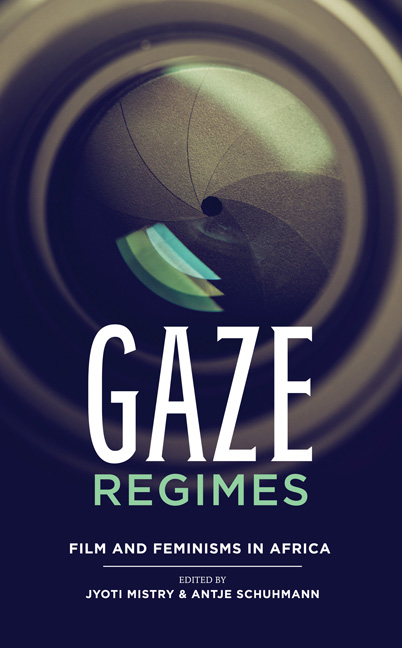Book contents
- Frontmatter
- Contents
- Acknowledgements
- Foreword: Goethe-Institut sub-Saharan Africa
- Introduction: By way of context and content
- 1 African Women in Cinema: An overview
- 2 ‘I am a feminist only in secret’
- 3 Staged Authenticity: Femininity in photography and film
- 4 ‘Power is in your own hands’: Why Jihan El-Tahri does not like movements
- 5 Aftermath – A focus on collective trauma
- 6 Shooting Violence and Trauma: Traversing visual and social topographies in Zanele Muholi's work
- 7 Puk Nini – A Filmic Instruction in Seduction: Exploring class and sexuality in gender relations
- 8 I am Saartjie Baartman
- 9 Filmmaking at the Margins of a Community: On co-producing Elelwani
- 10 On Collective Practice and Collected Reflections
- 11 ‘Cinema of resistance’
- 12 Dark and Personal
- 13 ‘Change? This might mean to shove a few men out’
- 14 Barakat! means Enough!
- 15 ‘Women, use the gaze to change reality’
- 16 Post-colonial Film Collaboration and Festival Politics
- 17 Tsitsi Dangarembga: A manifesto
- Acronyms and Abbreviations
- List of Contributors
- Filmography
- Index
8 - I am Saartjie Baartman
Published online by Cambridge University Press: 20 April 2018
- Frontmatter
- Contents
- Acknowledgements
- Foreword: Goethe-Institut sub-Saharan Africa
- Introduction: By way of context and content
- 1 African Women in Cinema: An overview
- 2 ‘I am a feminist only in secret’
- 3 Staged Authenticity: Femininity in photography and film
- 4 ‘Power is in your own hands’: Why Jihan El-Tahri does not like movements
- 5 Aftermath – A focus on collective trauma
- 6 Shooting Violence and Trauma: Traversing visual and social topographies in Zanele Muholi's work
- 7 Puk Nini – A Filmic Instruction in Seduction: Exploring class and sexuality in gender relations
- 8 I am Saartjie Baartman
- 9 Filmmaking at the Margins of a Community: On co-producing Elelwani
- 10 On Collective Practice and Collected Reflections
- 11 ‘Cinema of resistance’
- 12 Dark and Personal
- 13 ‘Change? This might mean to shove a few men out’
- 14 Barakat! means Enough!
- 15 ‘Women, use the gaze to change reality’
- 16 Post-colonial Film Collaboration and Festival Politics
- 17 Tsitsi Dangarembga: A manifesto
- Acronyms and Abbreviations
- List of Contributors
- Filmography
- Index
Summary
Saartjie Baartman has been utilised in a broad range of public articulations, including works by artists, writers, scientists, historians and filmmakers. These articulations can be located across Europe, Africa and the United States of America. Within the European context, specifically, the most significant writing on Baartman begins with the pseudo-scientific offerings made by French comparative anatomist and zoologist Georges Cuvier.
Baartman is an iconic figure who became a signifier of European cultural and scientific imperialism. Scientific racism constructed racialised notions of her body and genitalia, such as: the primitive, the savage, the animalistic, and the uncontrolled. The racialising and oversexualising of her body and genitalia, and the ideas espoused by this racialising process, produced images of ‘nation’. These were useful to her European exploiters and colonisers under the rubric of science. Later, in the South African context, the assumptions of Saartjie Baartman's life that rely on seeing her as a victim furnished the imaginary reconstructive project of the post-apartheid nation.
In more recent times, within the South African context there have been offerings made by Penny Siopis in visual arts and by Zola Maseko in film.
A comparative focus of this chapter will be Zola Maseko's films The Life and Times of Sara Baartman (1998) and The Return of Sara Baartman (2003). These films function within the rhetoric and image-making associated with the post-apartheid South African nation-building project as they employ representations of Baartman, her narrative and her body as tools in the broader political project of re-imagining and reconstructing the image of the post-apartheid nation.
This nation-building agenda relies on Baartman's perceived lack of personal will. The myths of Baartman's life have allowed the postapartheid South African national imaginary and its institutions of nation-building to overlook the sense of self-determinism that Baartman demonstrated within the social milieu of her lifetime. While Baartman's historical context did not contain social and political structures that allowed someone of her race and gender to make her agency public, she did, however, continuously demonstrate acts of self-determination. This is exemplified by what we know of her performances, singing on stages, and dancing and playing the guitar in the taverns of Cape Town (Holmes 2007:34). These performances defied her colonially-ascribed and actual role as a servant.
- Type
- Chapter
- Information
- Gaze RegimesFilm and feminisms in Africa, pp. 97 - 117Publisher: Wits University PressPrint publication year: 2015



